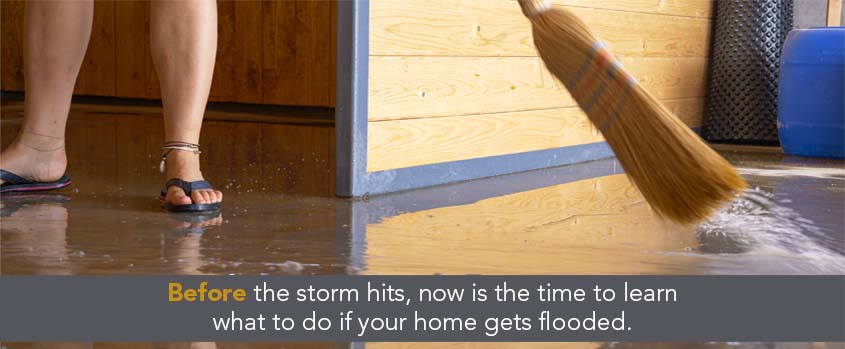
As the most common and costliest natural disaster, flooding is a risk that ALL Floridians are exposed to – whether they realize it or not. Yes, Florida is surrounded on three sides with oceans, and crisscrossed with rivers, lakes, and streams. But it’s also prone to frequent deluges of rainstorms, causing torrents of water to accumulate. The entire Sunshine State is a flood zone waiting to happen.
Blog Repost: What Is a Flood Zone?
Although not required by law, Florida Flood Insurance is a smart decision if you own property in the state. In addition to protecting your wallet, now is the time to learn what to do if your home gets flooded before the waters begin to rise.
Keep this checklist handy in case you need to begin the cleanup and rebuilding process after a flood.
Safety First
Before you dive in to getting your home back into livable condition, take some important safety precautions.
Even after emergency authorities have given the all-clear to return to your home, be aware of possible hazards. Look around for loose electrical wires, broken pipes or gas lines, downed power lines, and underground conduits that have been uncovered by flowing water. These could pose a threat to health and safety. You could suffer injury from electric shock or breathing in harmful gas.
As you enter your home for the first time, take note of any electrical wires, outlets, or fixtures that appear worn, loose, or otherwise damaged. Smell for gas or use a detection device to find gas leaks. Look for bowed walls, drooping roofs or ceilings, or other signs your home may have serious structural damage. If you see any signs like these, do not enter your home before having a professional inspection.
It is often recommended that you have professionals perform the following evaluations to your home after flood damage has occurred:
- Structural Inspection
- Electrical Inspection
- Gas Inspection
File a Claim with Your Florida Flood Insurance
Of course, if you have Florida flood insurance, you want to gather evidence for the required proof of loss so you can file a claim.
Throughout the process outlined below, keep a camera or smartphone handy for documenting water damage and other damages caused by the flooding. Compile lists of all your damaged property and whether or not it is reusable or will need to be replaced. Photograph everything indoors and outdoors, including after removing wet drywall and flooring.
Consult with your American Integrity Insurance agent for assistance with filing a damage claim, if necessary.
Protect Yourself
Some prior preparation to protect yourself is a wise use of your time before beginning the cleanup and reconstruction chores. Flood waters wash everything along indiscriminately, and can contain gross stuff from storm drains, home drains, sewer lines, and more toxic forms of waste.
Mold or other allergens will be prevalent, requiring you to cover your face, eyes, and body to prevent unwanted and potentially dangerous exposure. Wear long sleeves and pants; socks and shoes (preferably rubberized boots); face, eye, and breathing protection; and gloves when working inside or around your home after a flooding incident.
Replace this protective gear often to keep them clean and fully functional. Keep anyone with a suppressed immune system or strong allergies away from cleanup and rebuilding operations to prevent harm.
Get Everything Dry
After your home has flooded, you are in a race against time with mold growth and even more damage from moisture. Open windows and doors, set up fans and dehumidifiers, and otherwise keep air circulating throughout your home.
If you are depending on a generator for power, place it far from your home and direct its exhaust in the opposite direction. If your HVAC is in good working order, keep windows closed and use the air conditioner to circulate and dry out the home.
Fight Mold with Moisture
An affordable humidity meter and/or moisture meter is a good investment after your home has flooded. Keep tabs on the moisture level throughout your home, and try to maintain between 30 and 50 percent humidity.
Clean Up
Now, the dirty work begins. Remove all flood debris, mud, objects, and trash completely. Dispose of any items, furniture, and more that cannot be dried and reused. Be sure to check with local authorities about the proper methods for disposal of such items.
Check Appliances
Appliances can be seriously damaged by water from flooding, and much of this damage may not be visible. Just as flood water carries all manner of things throughout your home, this same gunk can become trapped inside your appliances.
If you believe an appliance may be reusable, have it examined closely and tested by a professional repair technician before attempting to use it.
Although this process can be frustrating, try not to rush through it, as you can prevent many headaches in the future by completing these tasks correctly the first time.
American Integrity Insurance is committed to providing Florida homeowners with sound, comprehensive insurance coverage and an extraordinary customer experience. We strive to be a valued partner to our policyholders, agents, and community.
We offer traditional and high valued homeowners insurance, condo insurance, renters insurance, and the special coverage required for vacant homes, manufactured homes, and policies designed for those who need less coverage or are renting out their home. We also offer extra protection, including flood insurance, umbrella insurance, golf cart insurance, boat insurance, cyber coverage and identity theft protection as well as equipment breakdown coverage, to help address a broad range of needs facing Florida homeowners today